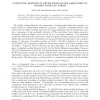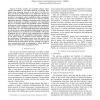6897 search results - page 49 / 1380 » Parallelization of Modular Algorithms |
123
click to vote
CCGRID
2003
IEEE
15 years 7 months ago
2003
IEEE
Clusters are now composed of non-uniform nodes with different CPUs, disks or network cards so that customers can adapt the cluster configuration to the changing technologies and t...
160
click to vote
EUMAS
2006
15 years 3 months ago
2006
We present a general Multi-Agent System framework for distributed data mining based on a Peer-toPeer model. The framework adopts message-based asynchronous communication and a dyn...
111
click to vote
GECCO
2007
Springer
15 years 8 months ago
2007
Springer
Recent work has provided functions that can be used to prove a principled distinction between the capabilities of mutation-based and crossover-based algorithms. However, prior fun...
135
click to vote
MOC
2011
14 years 9 months ago
2011
We utilize effective algorithms for computing in the cohomology of a Shimura curve together with the Jacquet-Langlands correspondence to compute systems of Hecke eigenvalues assoc...
115
click to vote
ICRA
2007
IEEE
15 years 8 months ago
2007
IEEE
— Portable, modular and extensible software allows robotics researchers to pool their resources by sharing algorithms, thus advancing research in the field of robotics at a fast...


